Gweedore GC (or Gailf Chumann Ghaoth Dobhair in Irish) was founded in 1927 at Magheragallon (Machair Gathlann) which is in the parish of Gweedore. As the name denotes, the course is routed over a Machair (
https://en.wikipedia.org/wiki/Machair) rather than a dune system that we typically see on links courses. Part of the course is on commonage and as a result of this, it is heavily grazed by sheep. With so many sheep, the grass has little chance to grow, so there is no rough except for some marram grass in some areas (although this is being lost at an alarming rate). The course consists of 9 holes which utilize alternative tees. So for example, the 7th is a 440 yds par 4 the first time around, while it's a 476 yds par 5 the second time. It's a par 71 and is 6201 yards long. On at least 3 occasions in the past, the club have attempted to extend it to 18 holes. However, due to commonage disputes, it has always been necessary to revert back to the 9 hole layout.
The pictures will give you some idea about how basic and simple the course is. I don't mean to say that it's simple in a non-strategic and boring way, but that there is very little maintenance done. There is no irrigation of the fairways or tees and watering of greens has to be done manually during very dry spells. The greens are cared for by an untrained part-time greenkeeper and other than raking a few bunkers, it's condition is probably as close as you'd get to an early 20th century course.
In recent years, the club have fenced in some land that it owns, so for the first time in decades, rough has been given an opportunity to grow. Although the loss of width may run contrary to the beliefs of many traditionalists on this discussion group, this re-emergence of flora (marram, red fescue, white clover, daisy, harebell, Lady's Bedstraw, Wild Thyme and Pyramidal Orchid) is a very welcome sight, when compared to the barren and over-grazed commonage. Due to the huge number of sheep, there has been much destruction in the dunes beyond the 6th and 7th holes. A number of new greens were totally ruined, in particular one on a beautiful par 3 that was played to an amphitheatre green set amongst the dunes.
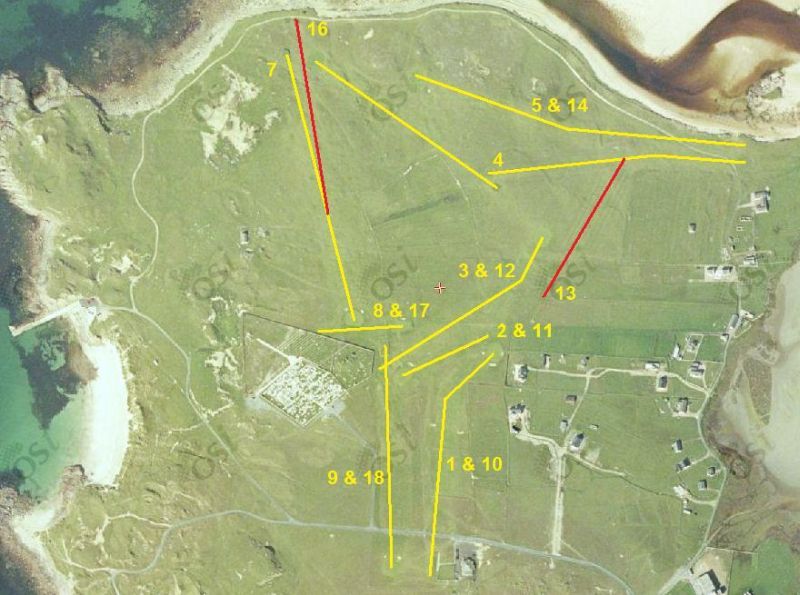 Gweedore layout.
Gweedore layout.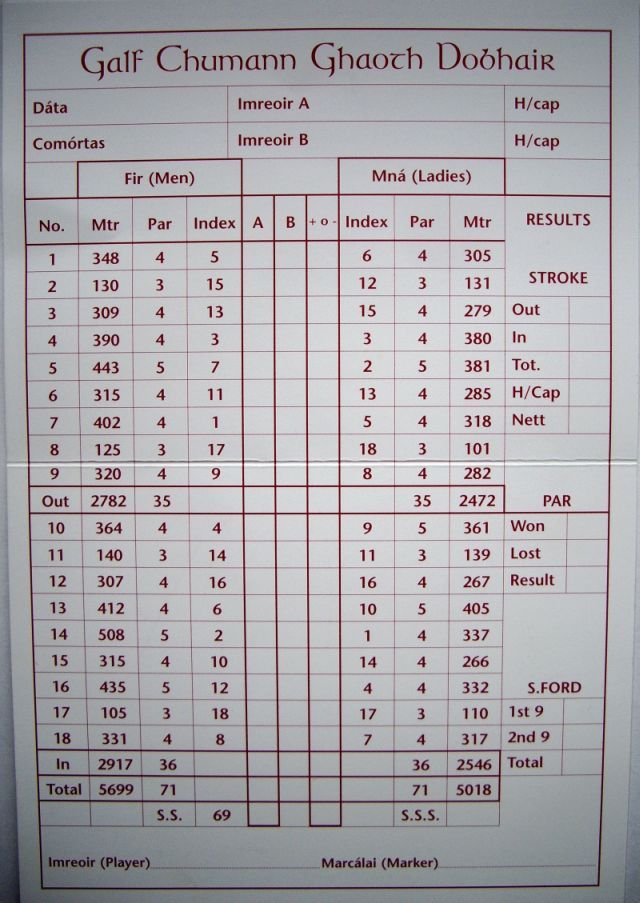 Gweedore's bilingual scorecard (2012). The club succumbed to the metric system recently.
Gweedore's bilingual scorecard (2012). The club succumbed to the metric system recently.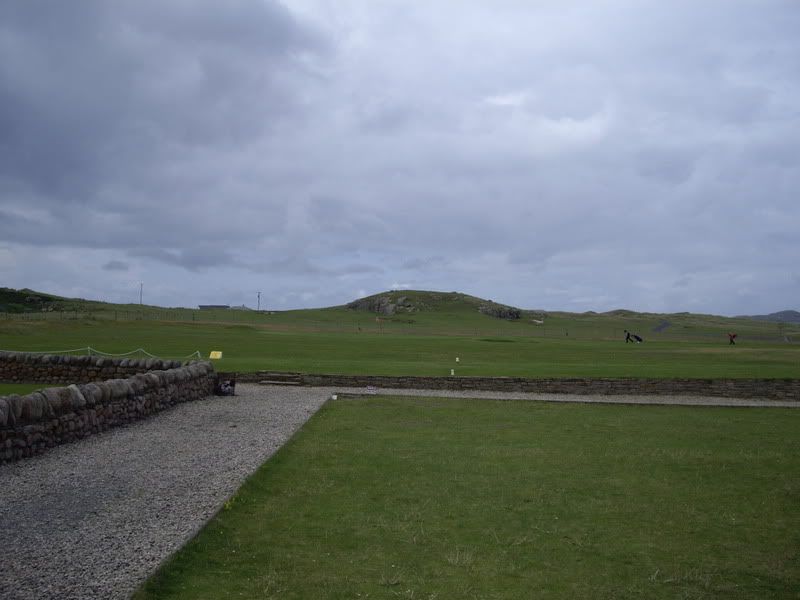
First impressions. A view across the 1st tee and 9th green. The hill in the distance is the site of a Ringfort dating from 500-1000 AD.
Although the scorecard lists meters, I'll give the hole yardages as they're the distances I've been familiar with since I was a child.
Hole 1 & 10, 380 yards / 398 yards, Par 4The hole is a dogleg with the green situated immediately to the left of the green fence bordering the houses. Out of bounds (OB) is all down the right hand side, so the approach is usually hit over the corner of the OB "garden".
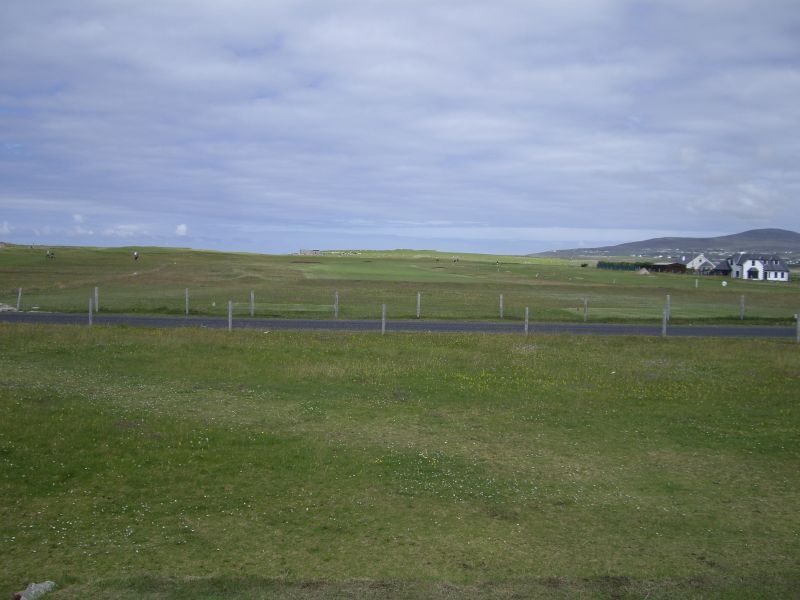
A tough driving hole - and a card wrecker - when the prevailing wind (over the left shoulder) is blowing hard. The tee shot generally needs to be hit on the line of the left edge of the fairway, as the wind blows towards the OB. A ball landing in the centre of the fairway will run and run and may trickle over the boundary line. It's not the kind of drive you want to be facing on the first tee.
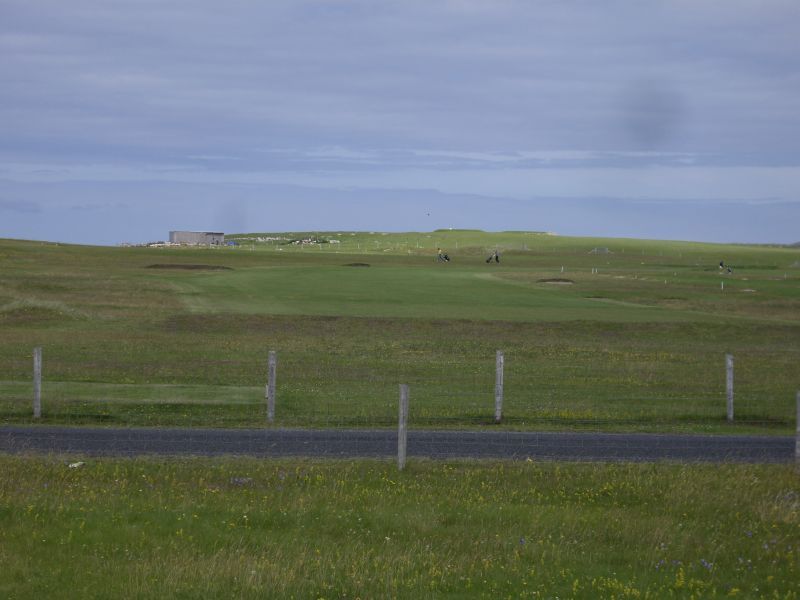
The right fairway bunker and the recently grown rough now provide a buffer between fairway and OB. This was not always the case, and the area where the bunker is positioned was always considered position A. I'd like to see the bunker and rough removed as it once was.
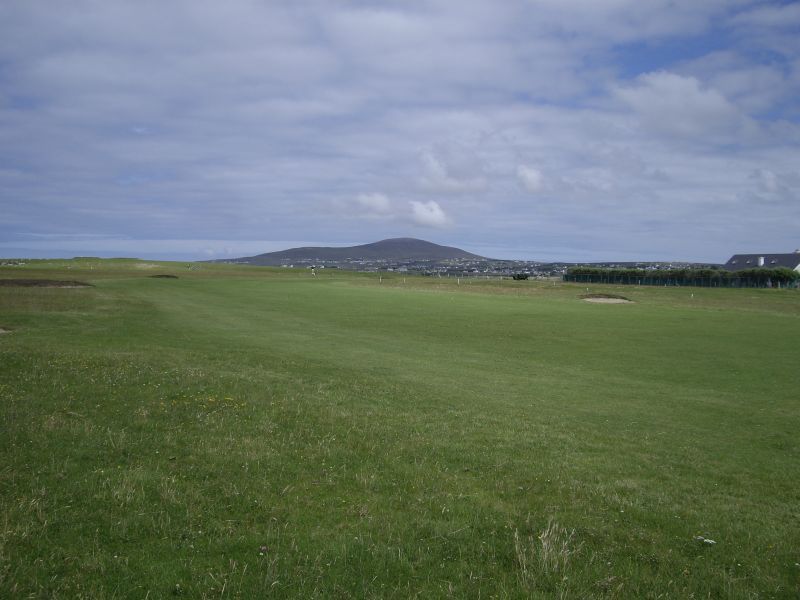
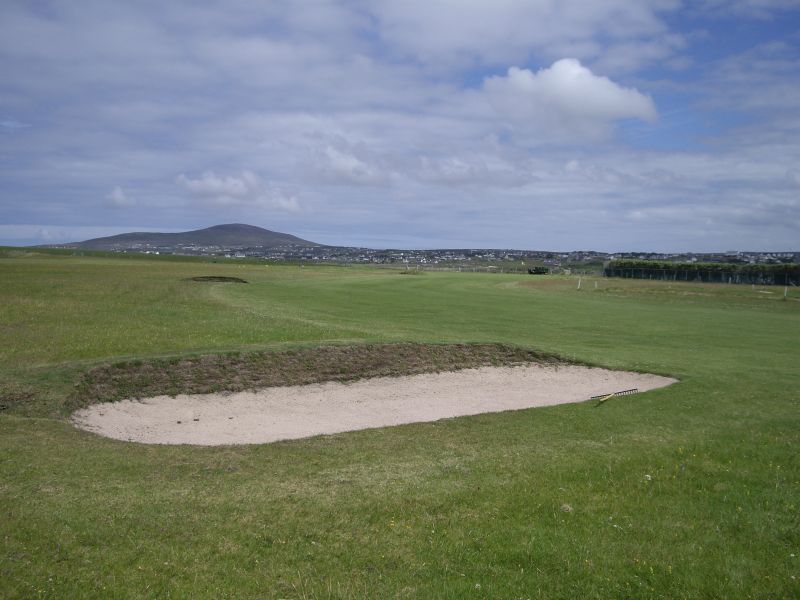
In recent years, a number of new bunkers have been constructed in the enclosed portion of the course. They're simple and unimaginative, but they do serve a purpose here by catching long drives that are played well away from the OB.
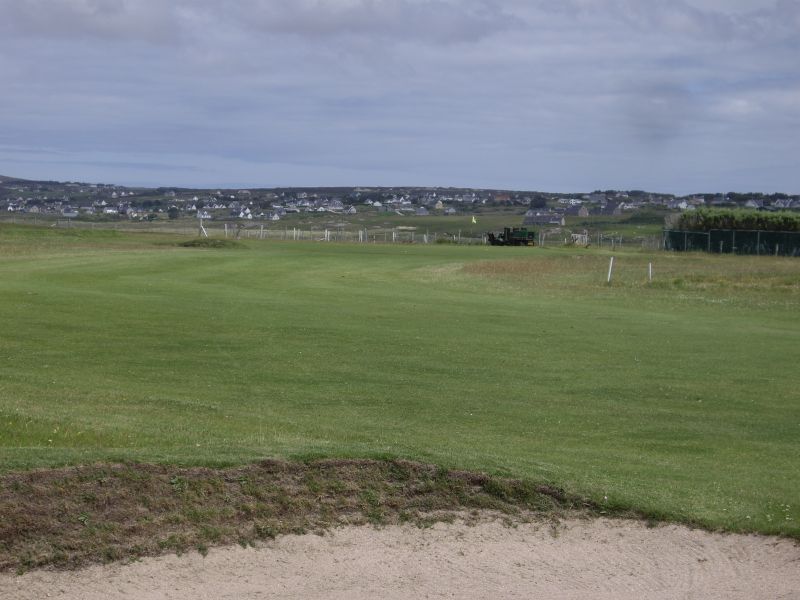
The OB posts bring home to the player how close a two stroke penalty is.
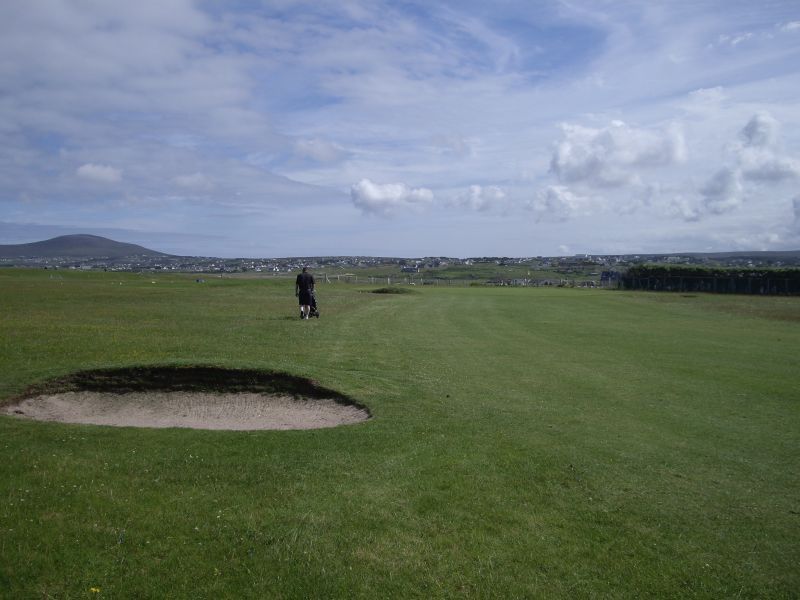
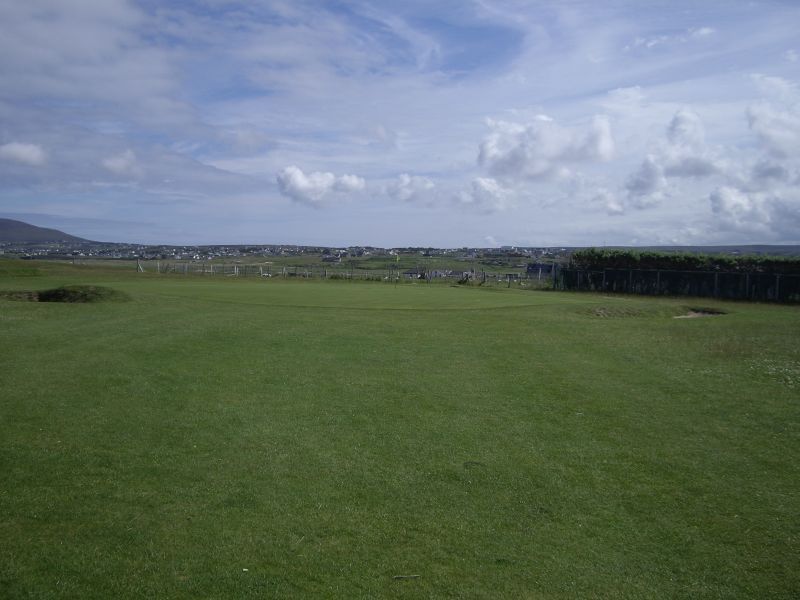
The entrance to the green is open to allow for play in windy conditions. With firm un-irrigated greens and fairways, the approach stroke must land several yards short of the green in order to avoid running through.
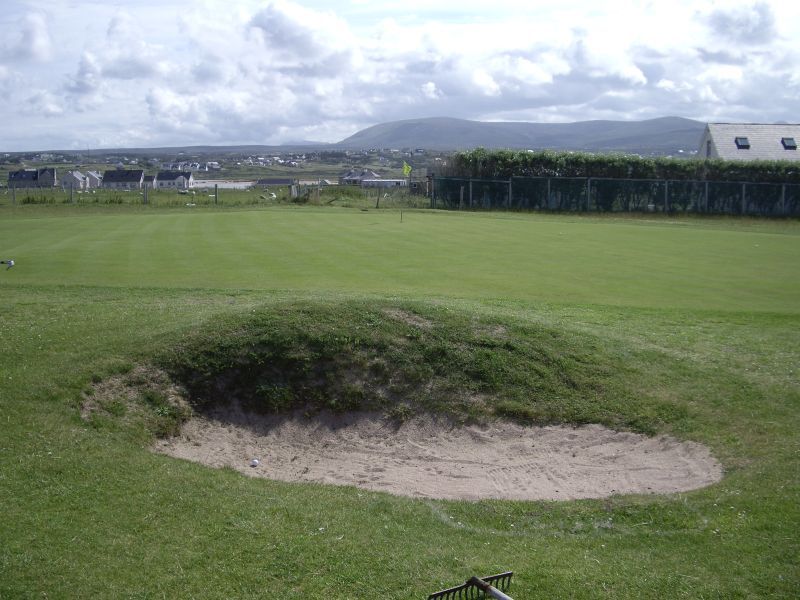
A bunker I worked on as a teenager. I'd like to think it looked a bit better all those year ago.
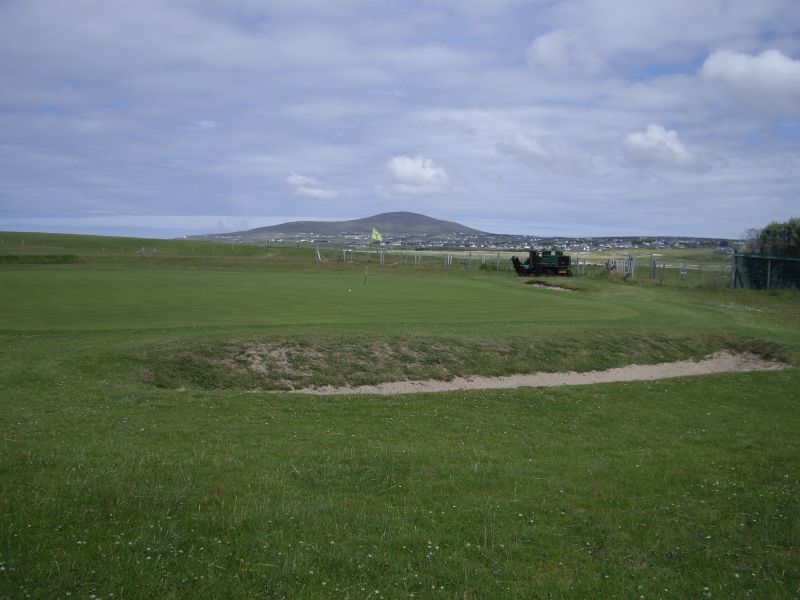
The OB at the rear of the green should not be forgotten!
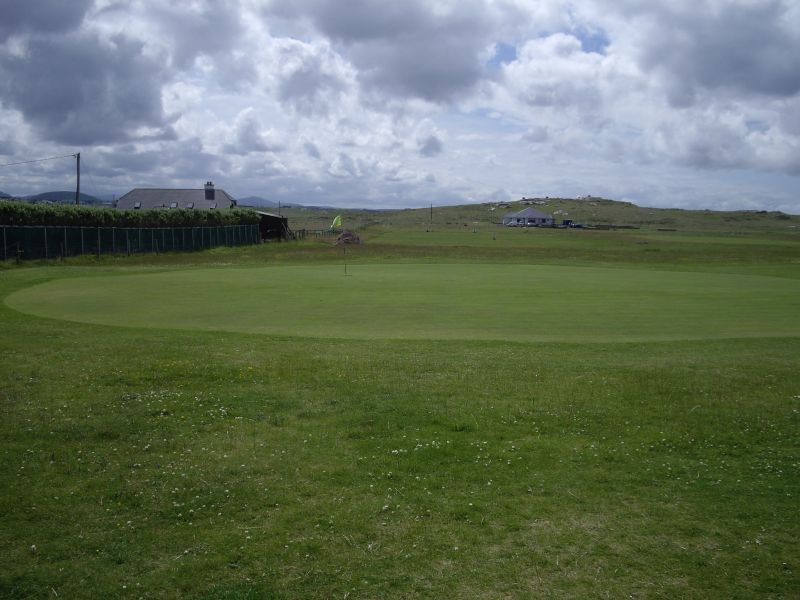
A view back towards the clubhouse; the tee box is located to the right of the clubhouse. All the land beyond the green is OB.
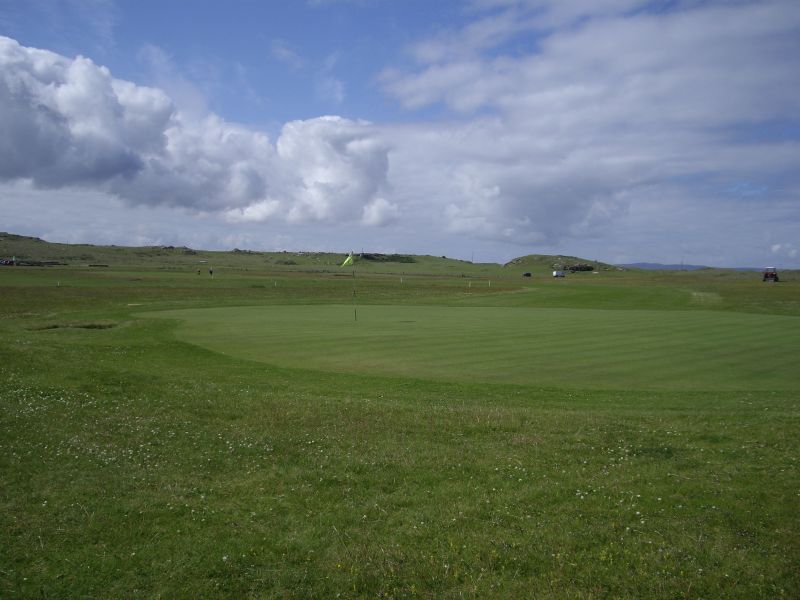
The unusual two tier green with the lower tier at the rear of the green, and not at the front, where we usually expect to see it. The difference in levels between the upper front tier and the lower rear tier is only about 5 inches. The two tier green is accidental, because the tier was formed when land boundaries were laid out. It's difficult to believe that this land was used for farming, as it's so poor.
Hole 2 & 11, 142 yards / 153 yards, Par 3The second green was at one time one of the most stunning green sites imaginable. Several botched modifications and constant tinkering with the green over the years have made the hole less difficult and have also spoiled what was once a great hole. No, I haven't taken a double dose of medicine by accident.

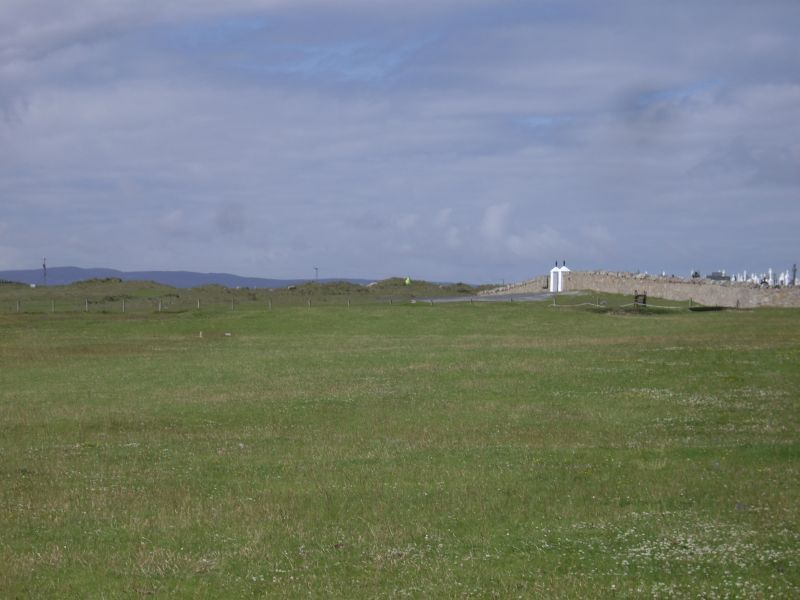
The initial view doesn't generate any excitement, as the green is obscured by some small mounds just short of the green. This hole usually plays into a wind coming from about 10 o'clock. The entrance to the green is not as narrow as it once was, and two bunkers just barely visible to the right need to be avoided. Anything hit long left, over the green or long right will make for a tough recovery. The safest area to miss the green is short left where there is a plateau about 2 feet below the putting surface level.
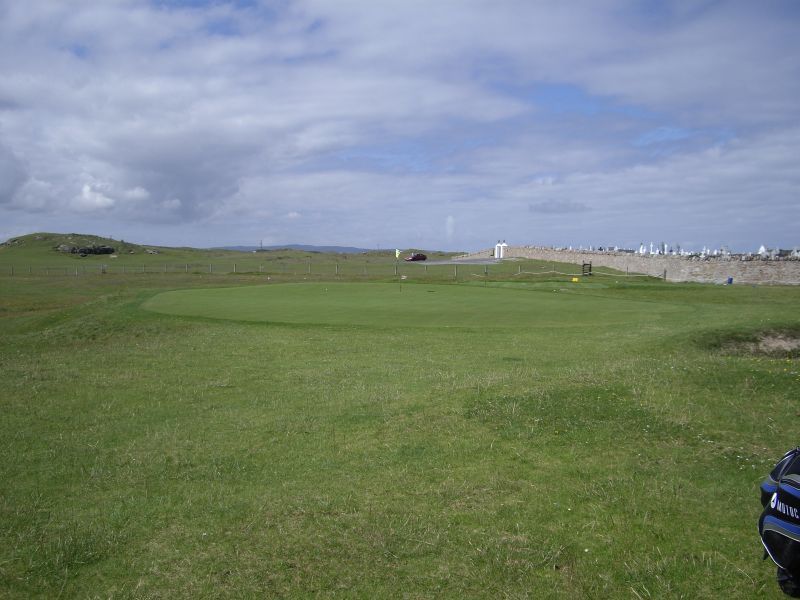
The level entrance to the green.
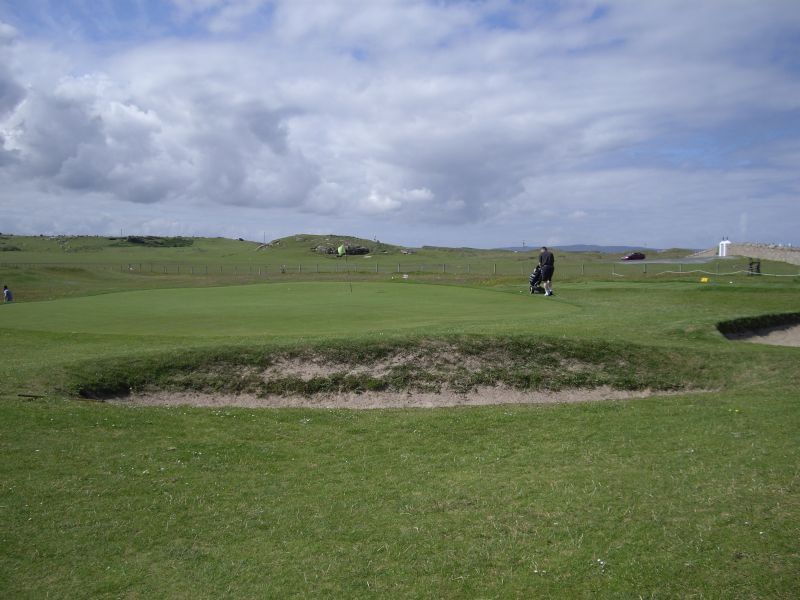
The two bunkers to be avoided on the right side of the green.
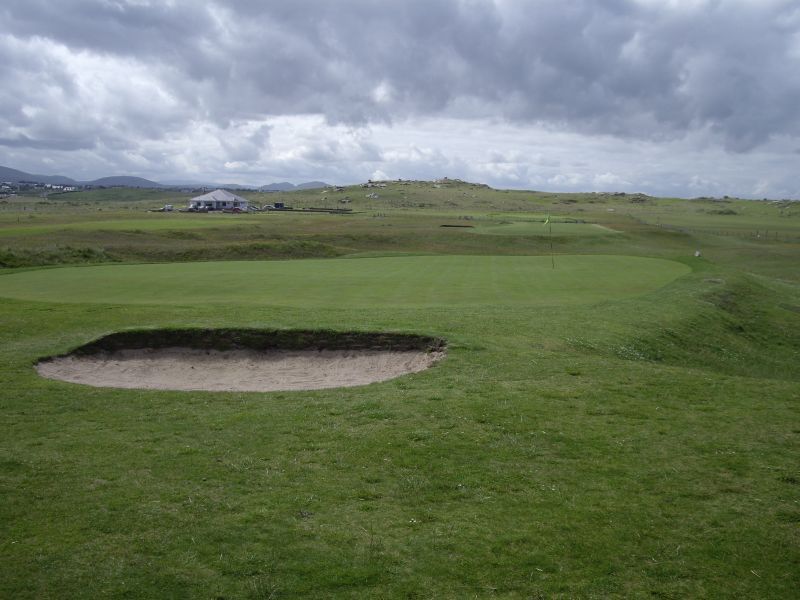
The area where the bunker is located was once a hollow. During the 1980s, an extension to 18 holes was planned and in the new routing, this green was to be approached from a different angle. The proposed hole was a par four, and the orientation of the green would have proved too difficult a target. The hollow was filled in; the green site was destroyed and the 18 hole extension never got off the ground.
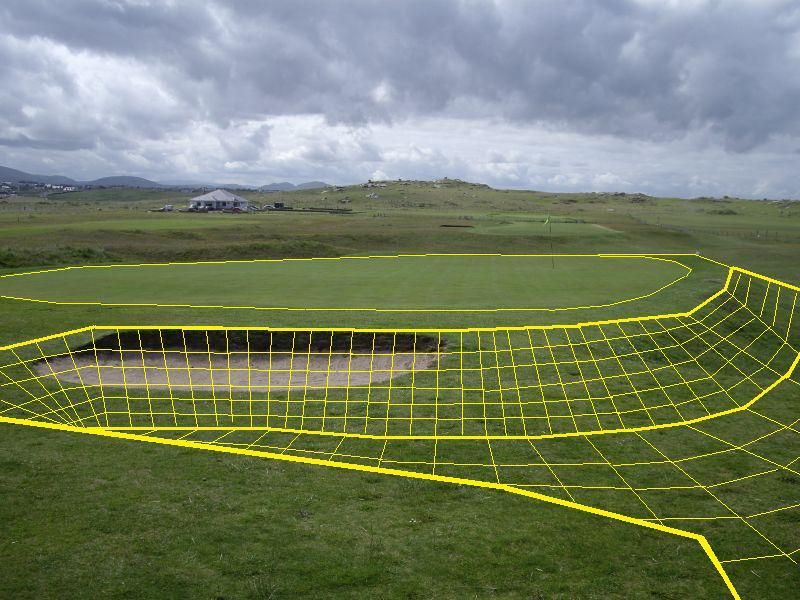
I'd love if the green site was restored to something like its former shape. Clearly I'm no Ben Stephens when it comes to graphics.

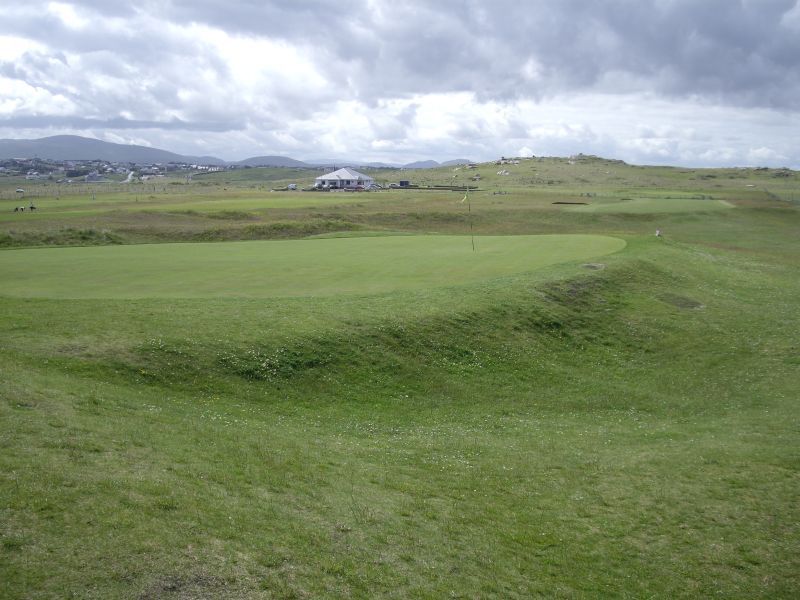
The view from the back right side of the green.
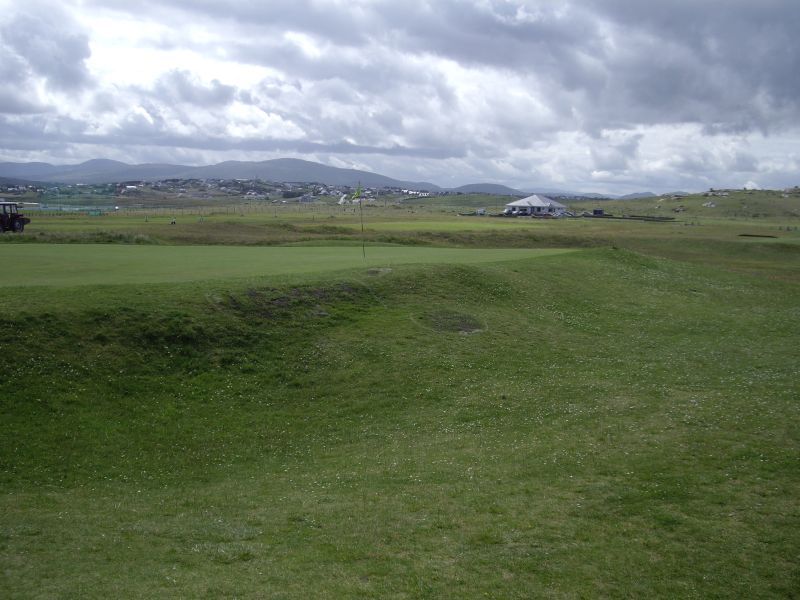
The back of the green is usually the worst place to leave your tee shot. If the hole is towards the back - as it usually is - getting close requires the deftest of touches with a putter or whatever you use to bump and run. When putting, there's always a danger of knocking it past the flag and into the hollow in front of the green. The green is usually firm and it slopes from back to front, so lobbing a chip is not a good idea. The safest option is to putt and make sure you get up the slope. I have see countless players over the years leaving putts short or putting off the other side of the green.
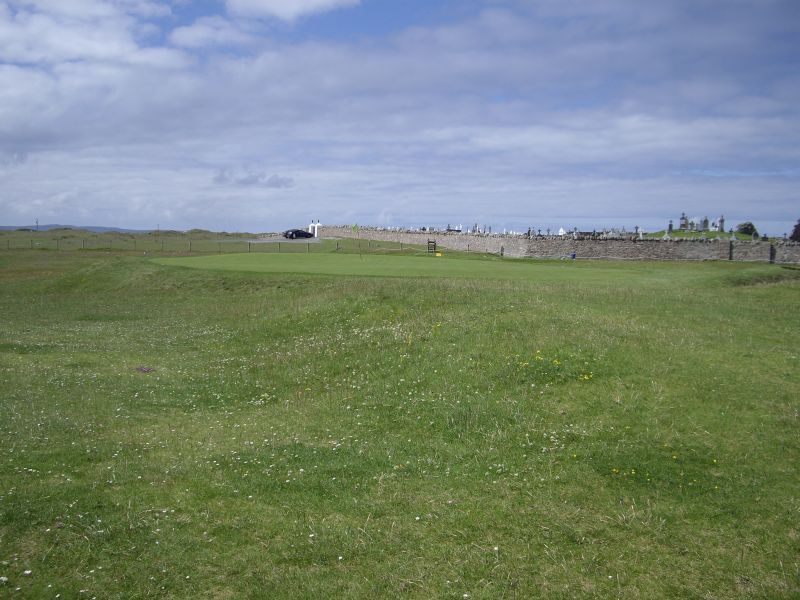
The plateau lies to the left and is a good spot from which to save par. The area to the right is a few feet higher than the plateau, although this picture does not adequately illustrate this.
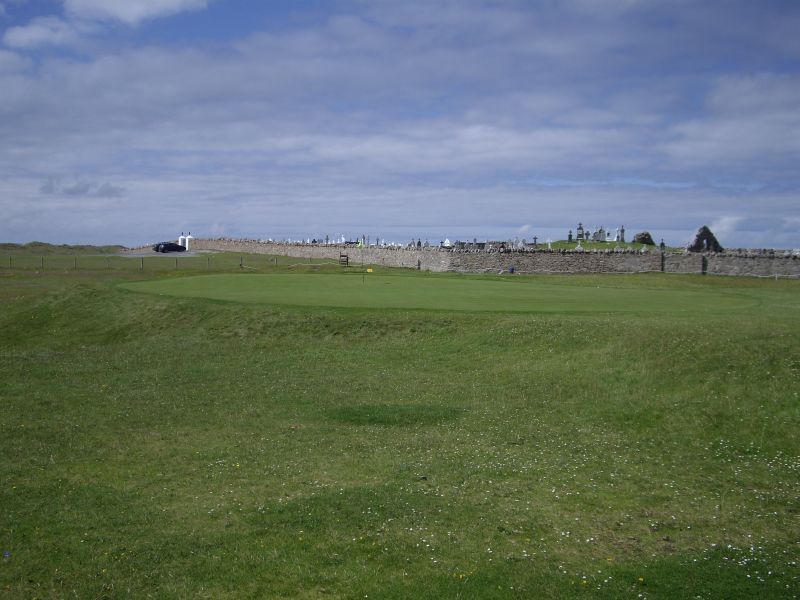
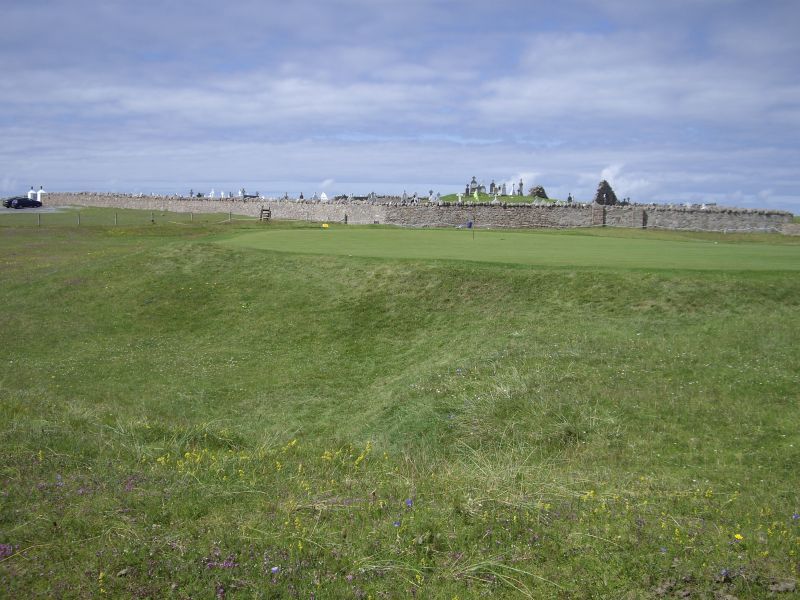
The plateau falls off very steeply to the left and into a hollow where recovery is extremely difficult.
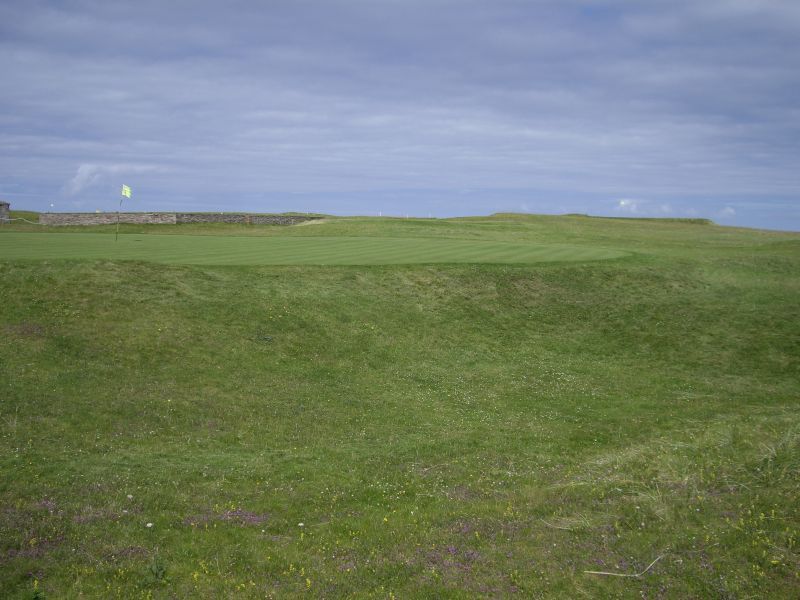
It used to be - and it was usually the best option - possible to putt from this hollow. Since the sheep have been removed, the slopes have become less bare, so a chip is now the preferred option for most players. It was always touch-and-go whether the ball would get up the slope. Since the slope is quite steep and not so uniform, an "unlucky" bounce off the slope sometimes got the putt airborne, and shortly afterwards, the ball was right back at your feet again.
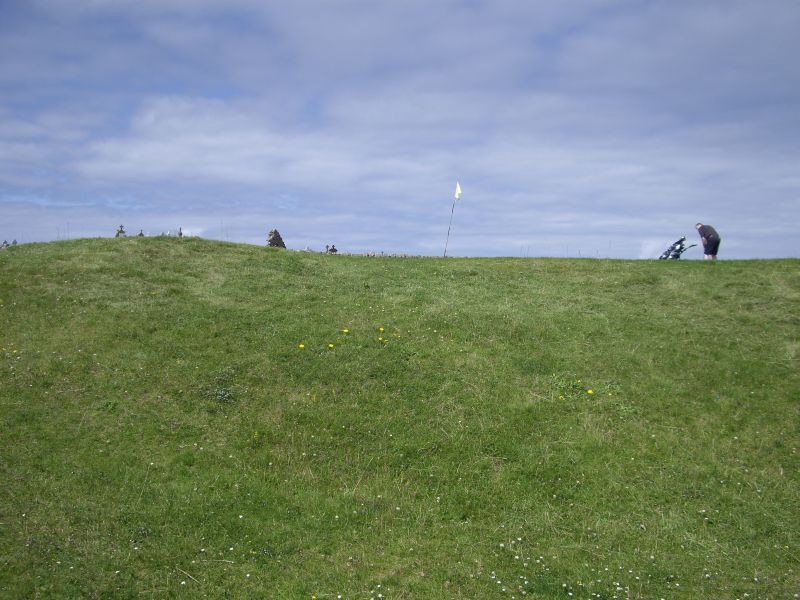
The view from the hollow left of the green.
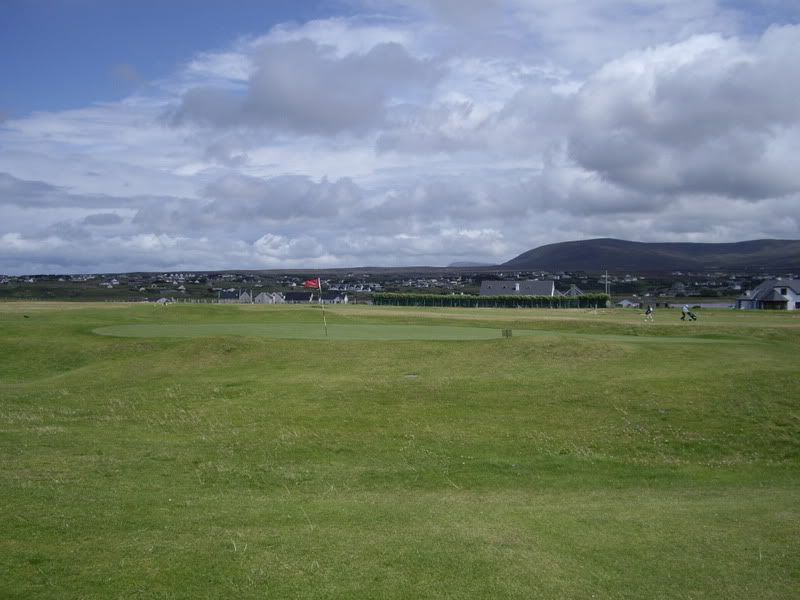
A closer view of the slope at the back of the green.The ground level here is about 4 feet below the green level. The green slopes quite steeply from back to front, so putts from the back of the green are extremely difficult. Opting to chip is pure madness.
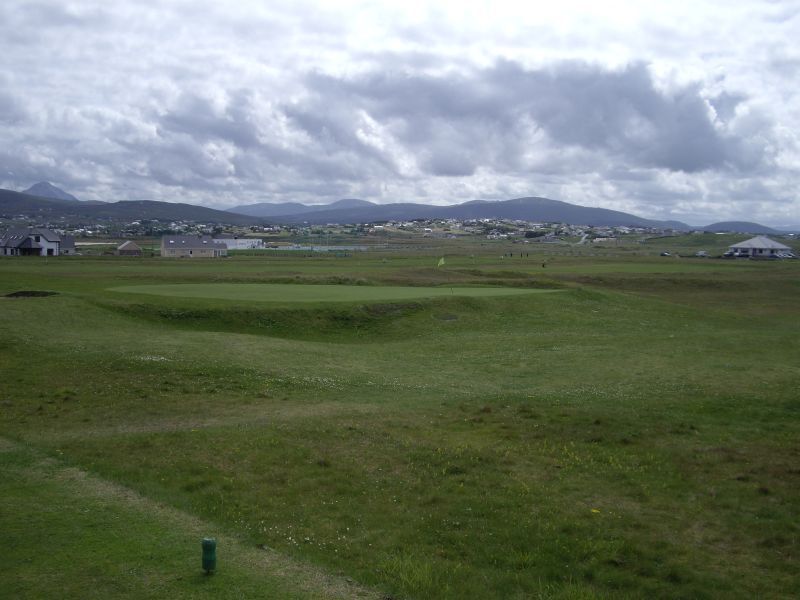
The view from the 3rd tee.
Hole 3 & 12, 338 yard / 305 yards, Par 4The third hole is one of the most difficult holes on the course. Its one and only defence is a wicked green that slopes from both front to back and left to right. I have no idea what the tilt of the green is, but getting your second shot to stop on the green during a very dry summer can be next to impossible. Fortunately, the greens are never quicker than about 8.
The hole is drivable but you need a good helping wind, combined with a lowish trajectory with a slight draw in order for the ball to run up the slope just short of the green. I've only ever see two players drive the green and they were both scratch players.

For the first timer, it's difficult to know what line to take off the tee, and it doesn't appear to matter much, when standing on the tee. The green is on the ridge directly above the red tee marker in the distance, and hitting straight for it will leave you right in the middle of the fairway.
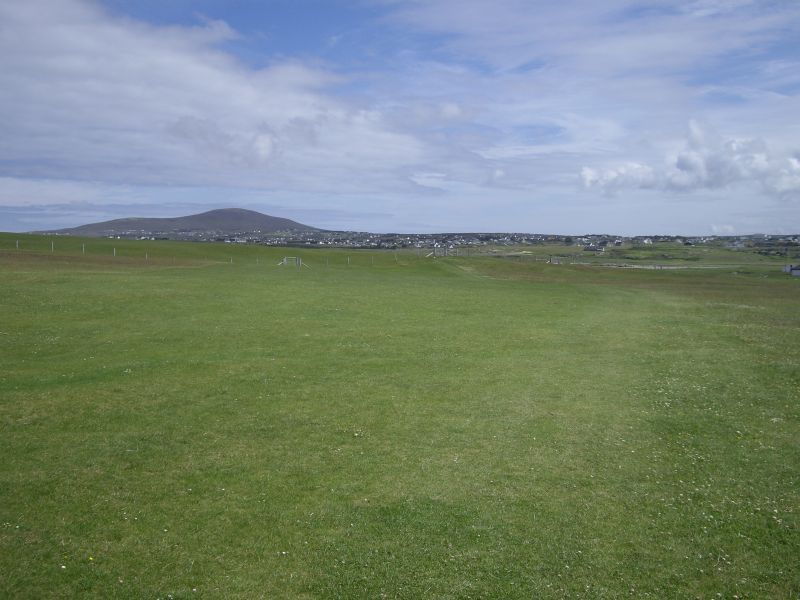
Now that the sheep no longer graze on this part of the course, there is some rough, but it could hardly be described as penal. The fairway lacks definition as the rough is patchy and wispy in places.
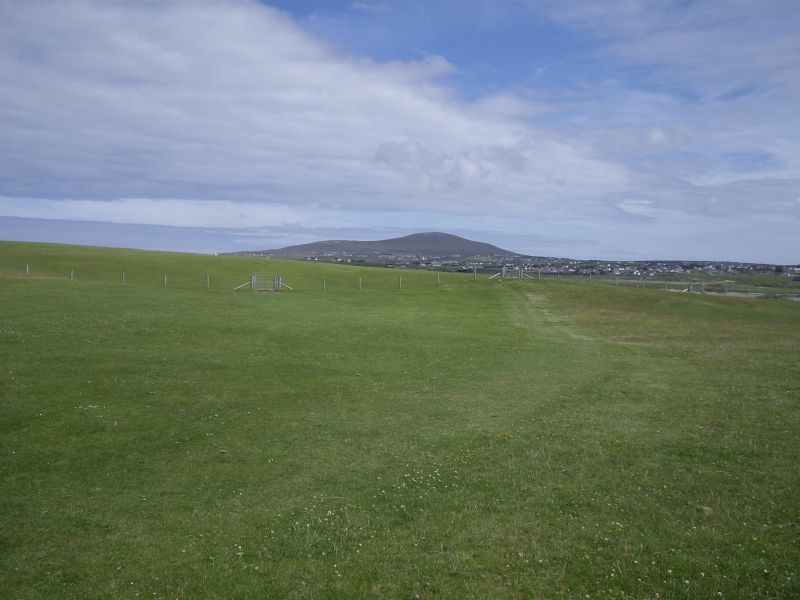
The yellow flag is just visible on the other side of the fence.
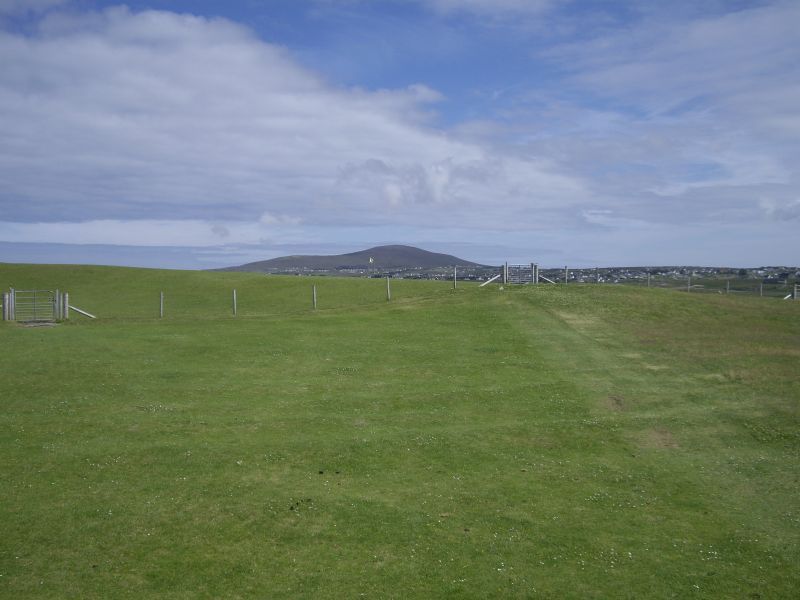
The ground begins to rise again when we are within 50 yards of the green. A drive that end ups here on the right edge of the fairway, or even in the semi-rough will give the best angle to approach the green. The pitch should be played so that it lands 5-10 yards short of the green, and also up to 5-7 yards left of the flag. Hopefully the end result will be an uphill putt of a few yards.
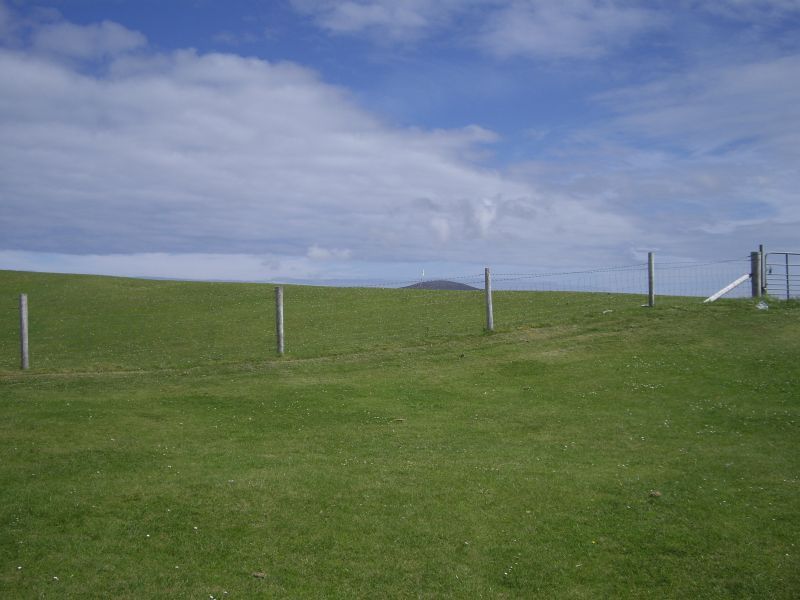
The green lies about 30 yds over the brow of the hill. The flag can be seen on the horizon. There are no each pitch shots from this side of the green.
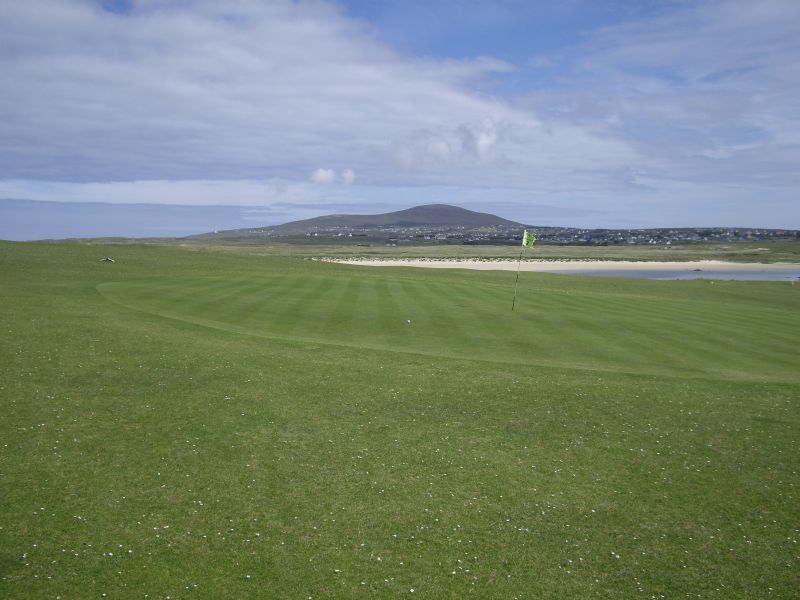
Yes, the green is every bit as difficult as it appears. Getting down in two from where the ball is positioned is not a foregone conclusion.
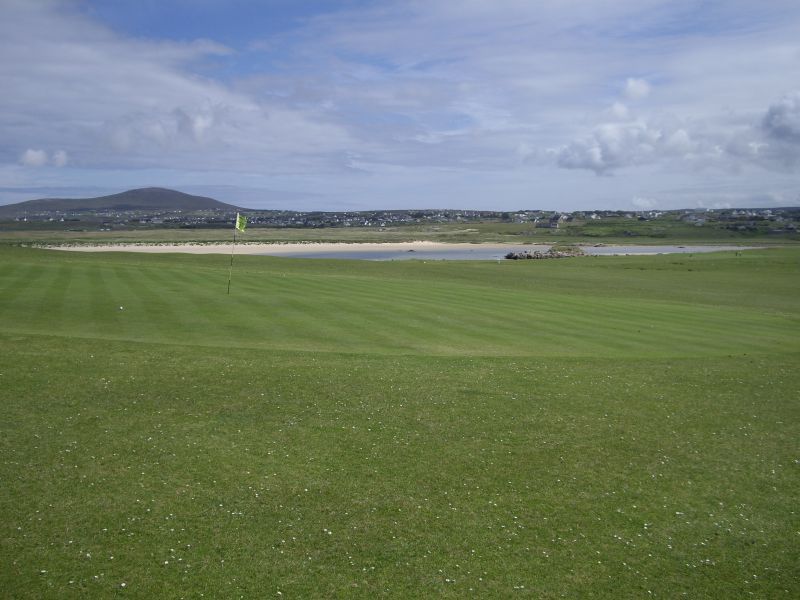
A fair amount of approach shots - and sometimes putts - come to rest down to the right below the green.

A view of the green from the back left side.

A look back down the fairway.
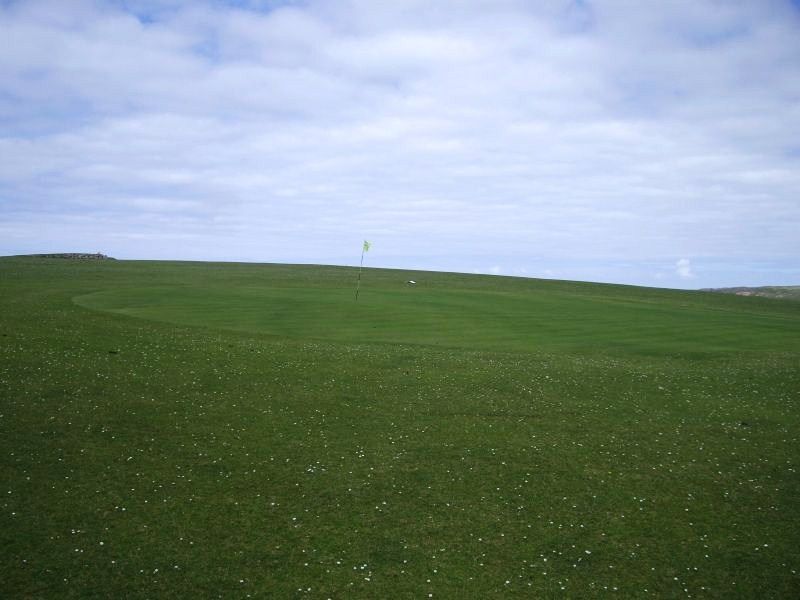
Another view of the green from the front right side. In the above photo, the approach shot comes from the left. The green slopes from left to right, so approach shot must land about 10 yds short of the green to have any possibility of remaining on the green. Anything that hits the green ends up down to the right and usually about 5-10 yards off the green. I believe this is a great hole, but perhaps a little too severe in windy or very dry conditions. Take your par, breathe a sigh of relief and head to the next tee.
Hole 4, 410 yards, Par 4We are now in the large area of commonage where serious overgrazing by sheep is clearly evident. A closer examination of the ground illustrates how devoid of grass this part of the course is. One can hardly use the term fairway to describe these windswept plains.
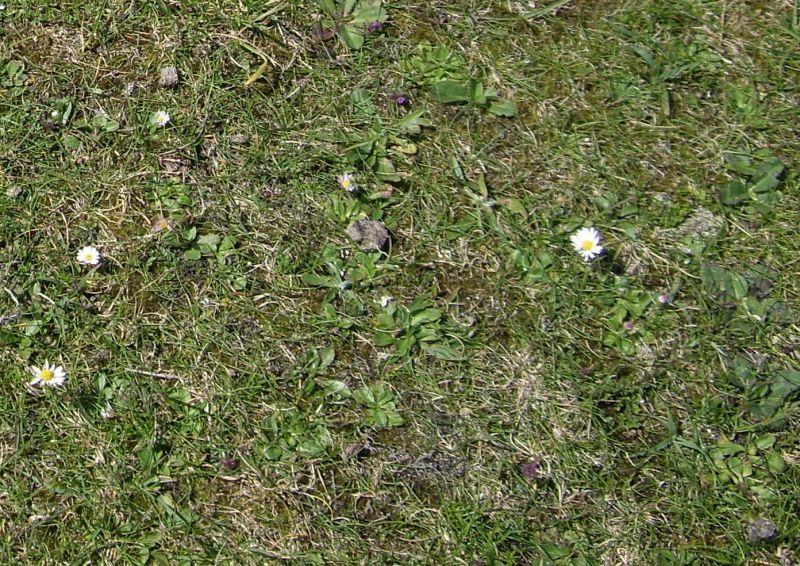
The ball seldom sits up in the commonage area. A good clean strike is always required from these bare lies.
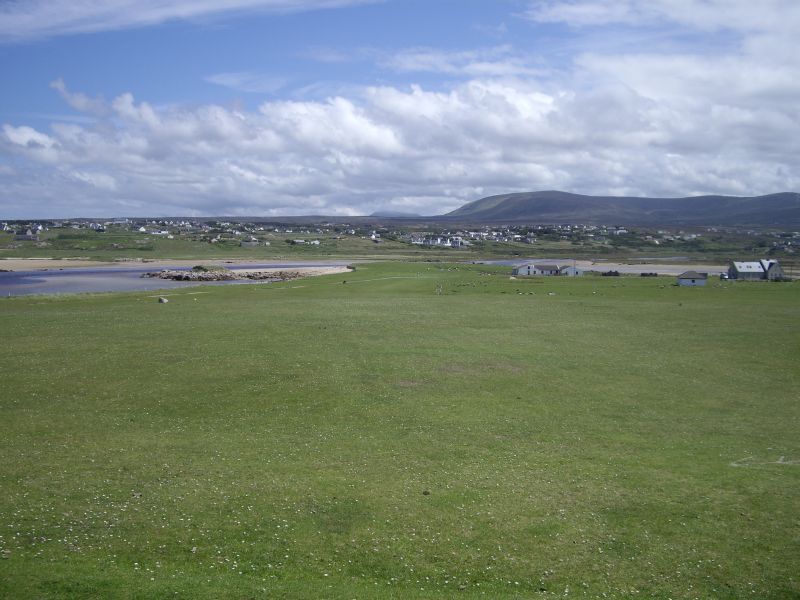
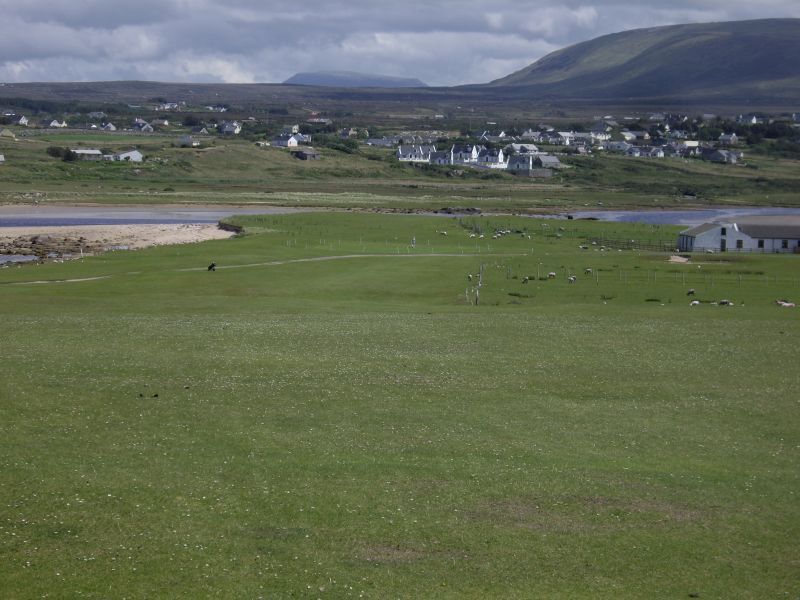
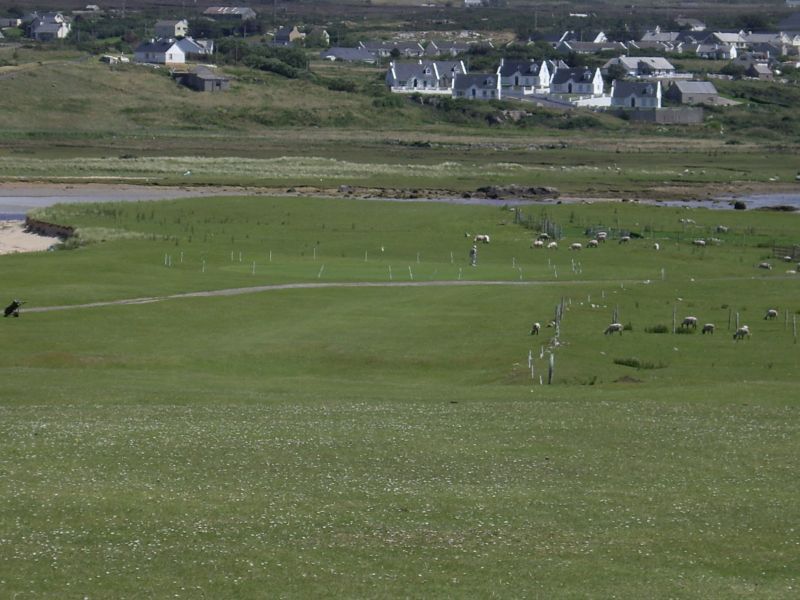
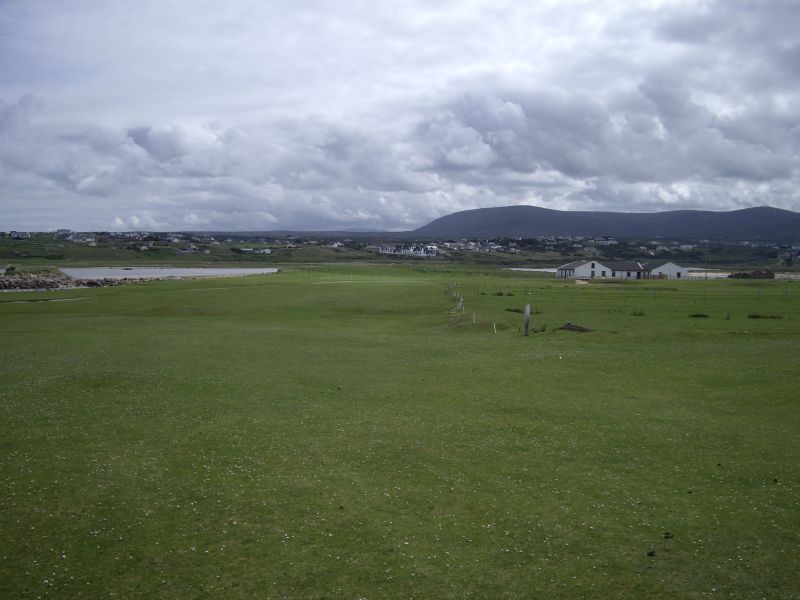
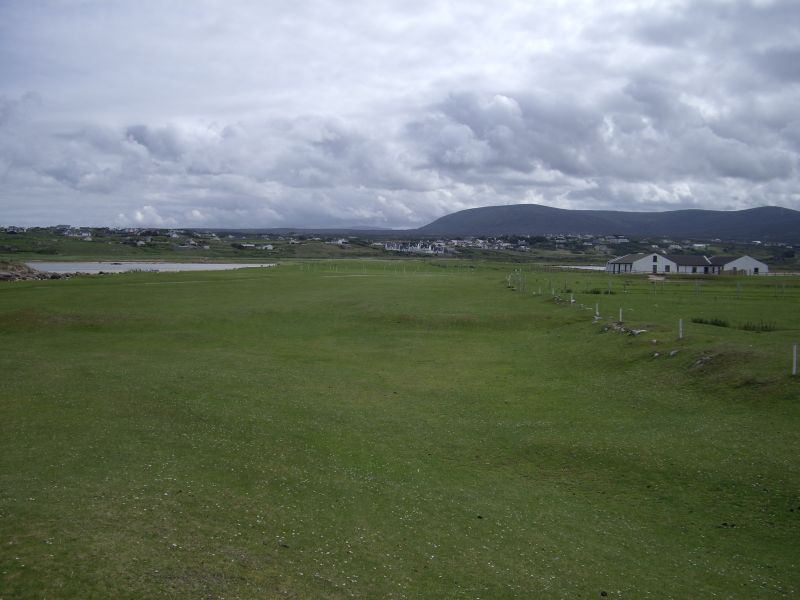
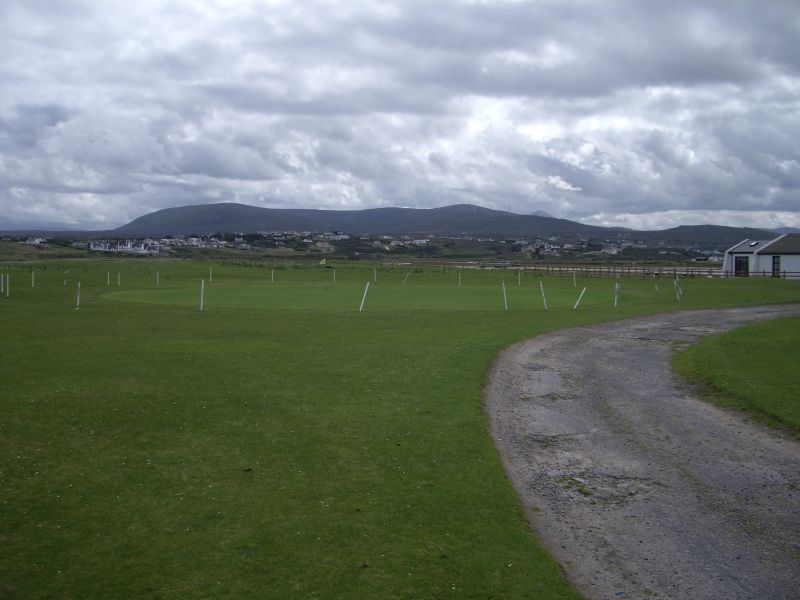
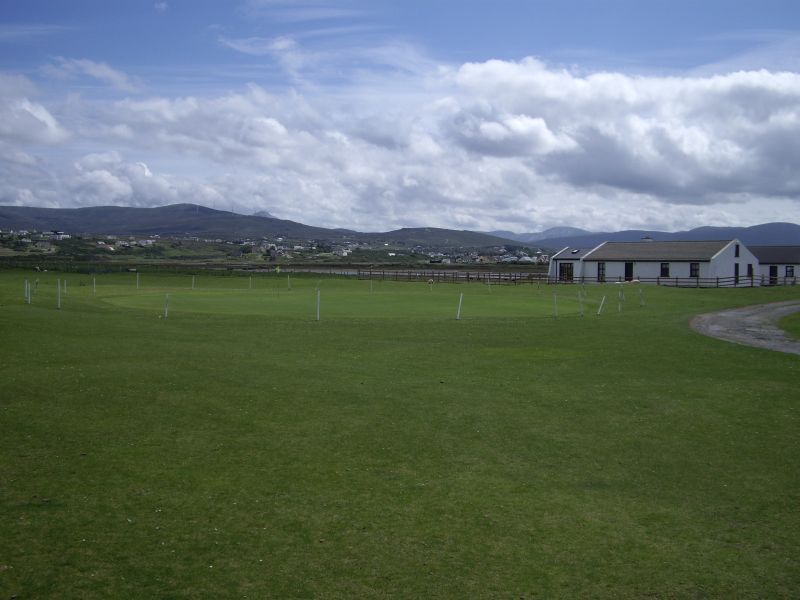 Hole 13, 450 yards, Par 4
Hole 13, 450 yards, Par 4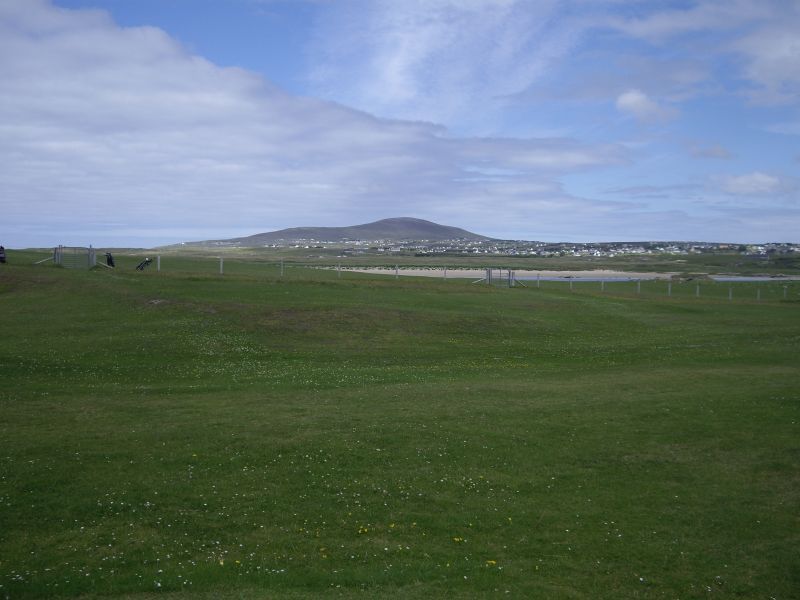
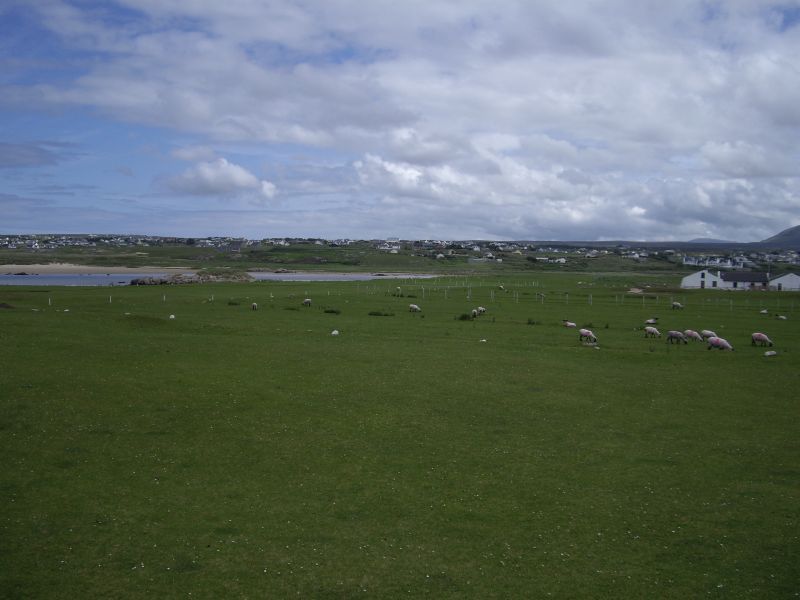
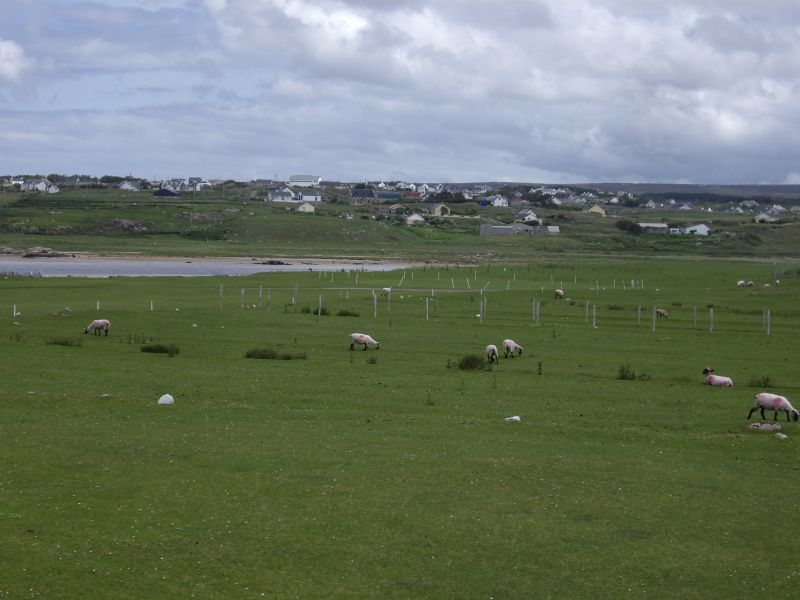
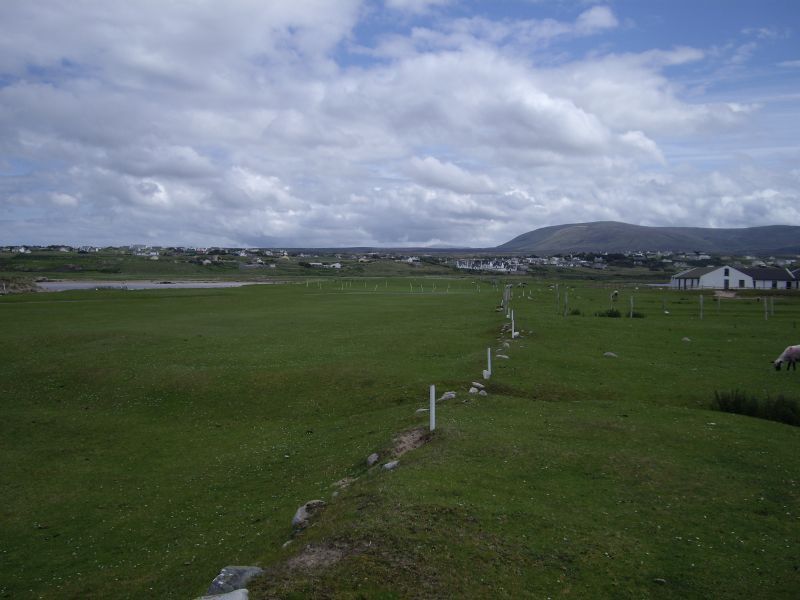
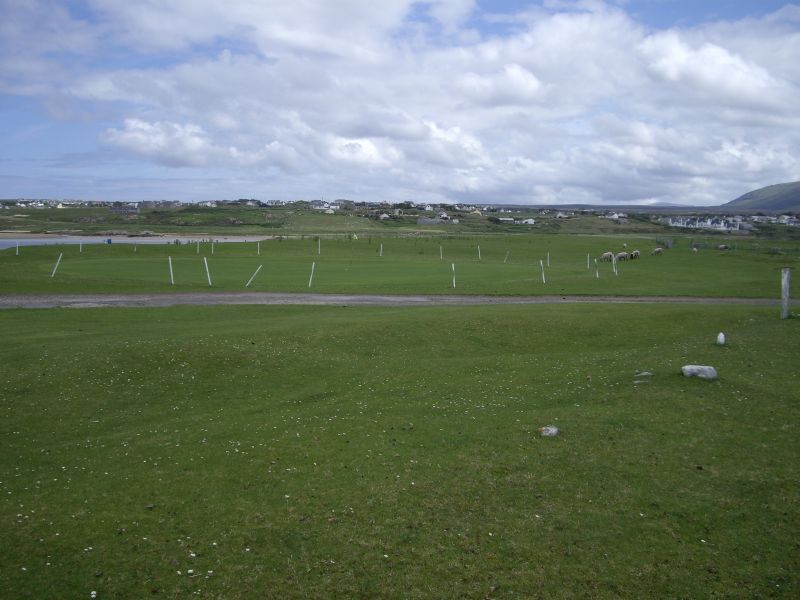
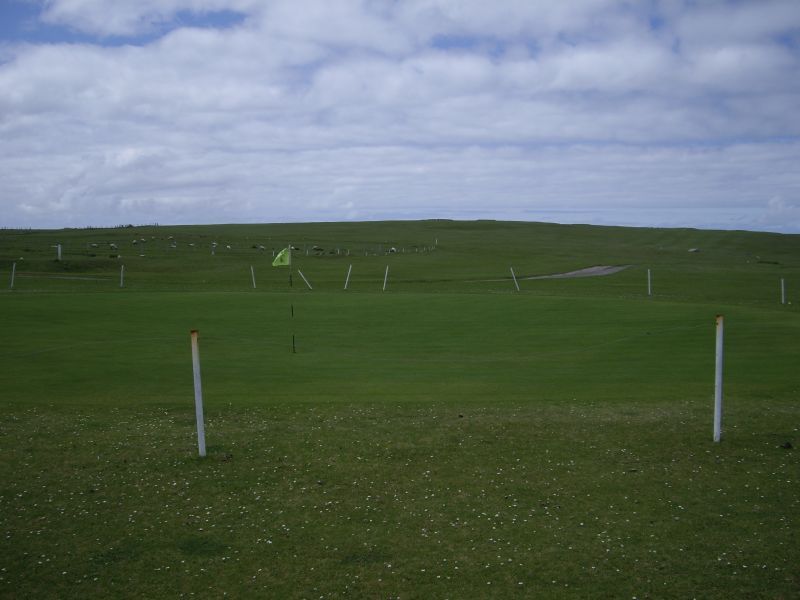 Hole 5 & 14, 484 yards / 556 yards, Par 5
Hole 5 & 14, 484 yards / 556 yards, Par 5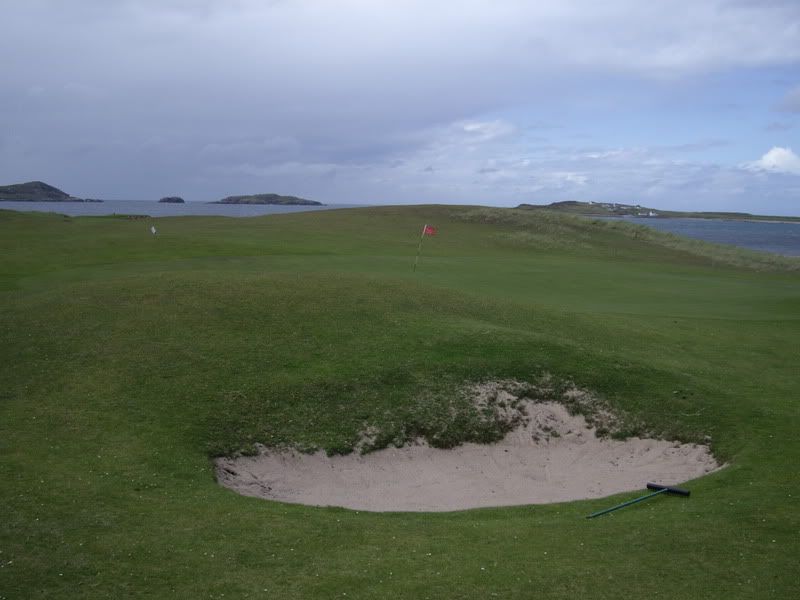
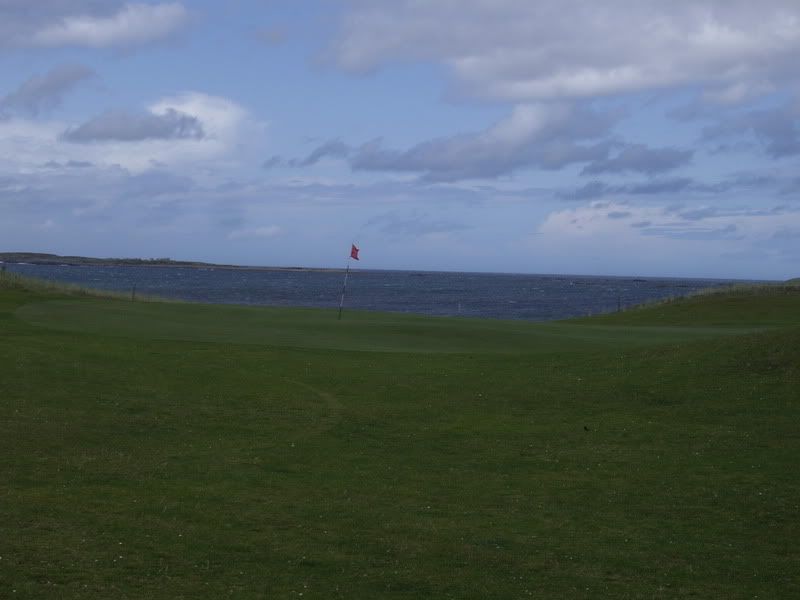
A view of the 5th / 14th green. There no point in describing this hole, since I don't have a good picture, except to say it's 556 yds uphill all the way!!
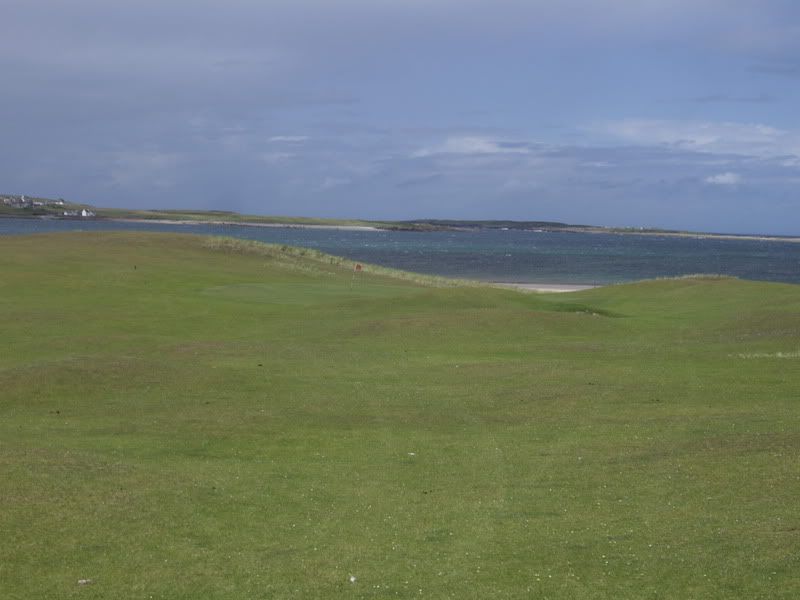 5th/14th green:
5th/14th green: View from the 6th fairway.
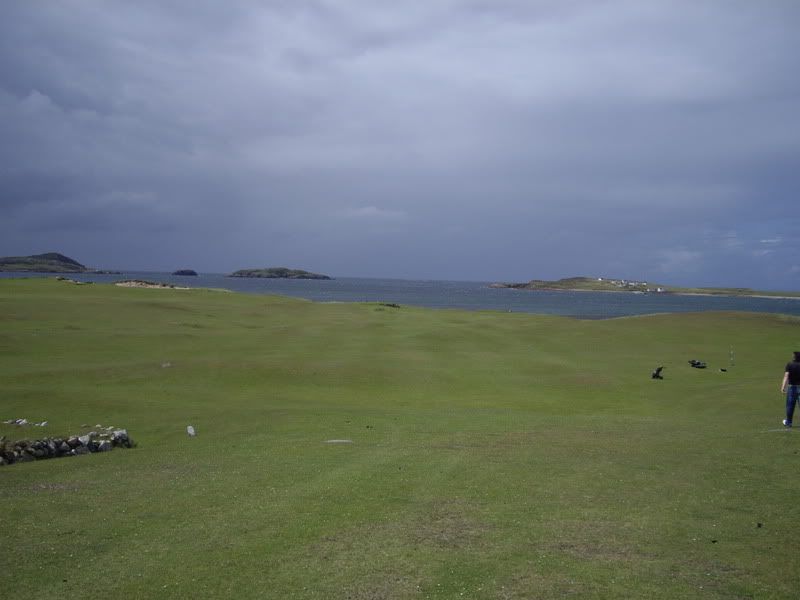 6th/15th hole: 345 yds/ 345 yds, Par 4
6th/15th hole: 345 yds/ 345 yds, Par 4Who said the 1st/18th fairway at St. Andrews is the widest fairway in golf?
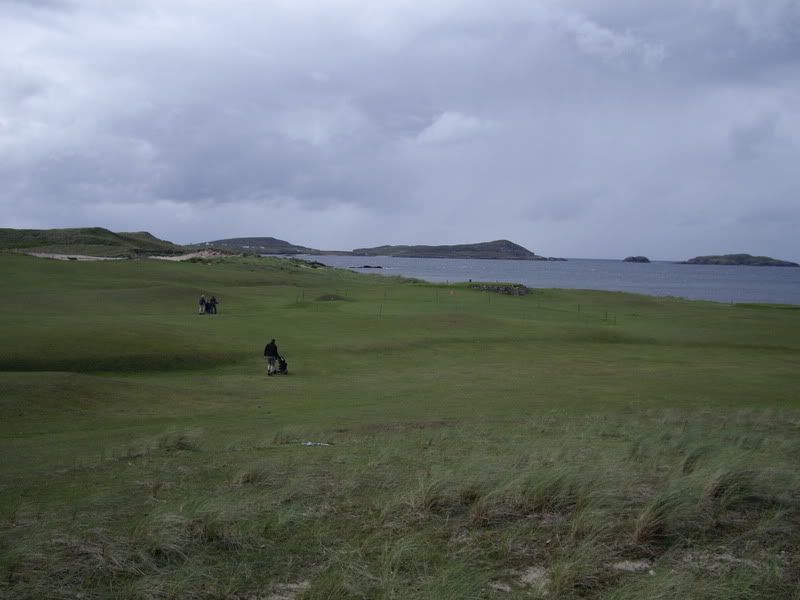 6th/15th hole from right of the fairway.
6th/15th hole from right of the fairway.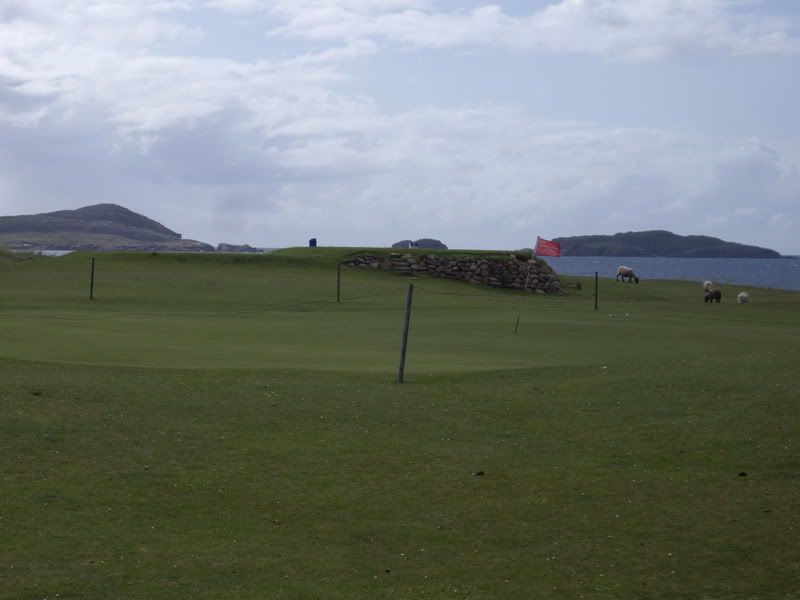 6th/15th green.
6th/15th green. Local rule: You can re-take your shot if you hit a sheep!!
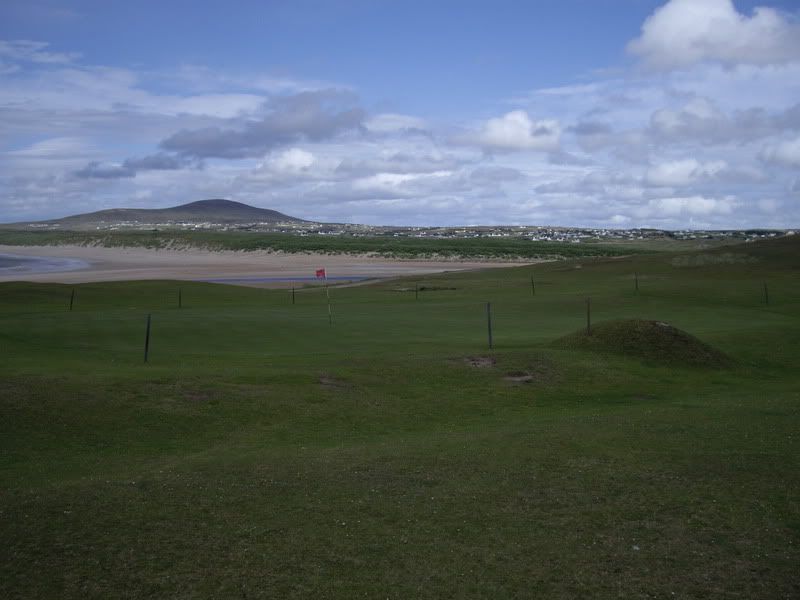 6th/15th green:
6th/15th green: Notice the "chocolate drop" which hides a large rock.
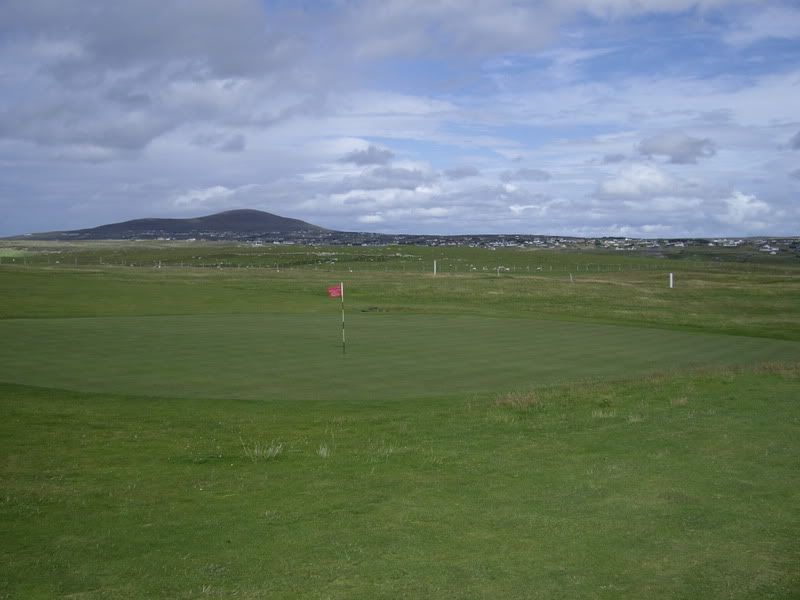 7th/16th hole: 440 yds/ 476 yds, Par 4/5
7th/16th hole: 440 yds/ 476 yds, Par 4/5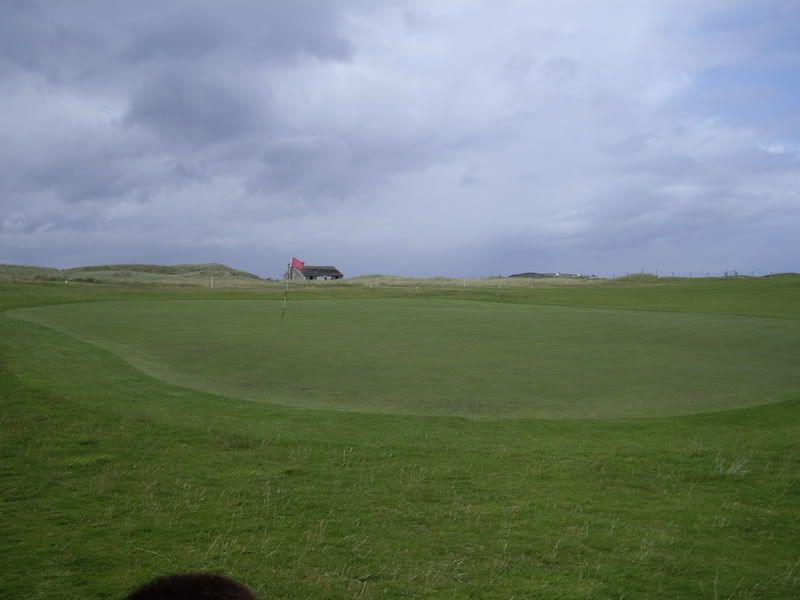 7th/16th green.
7th/16th green.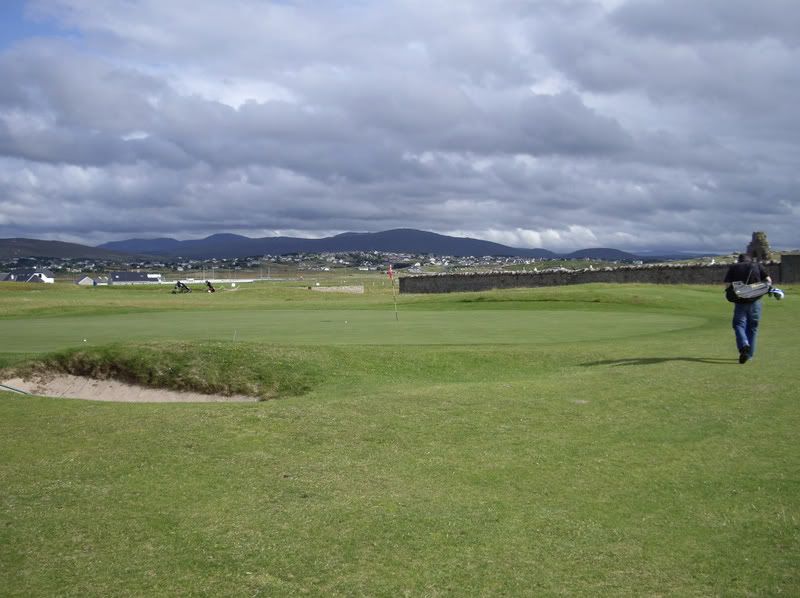 Approaching the 7th/16th green:
Approaching the 7th/16th green: The graveyard is out of bounds!!
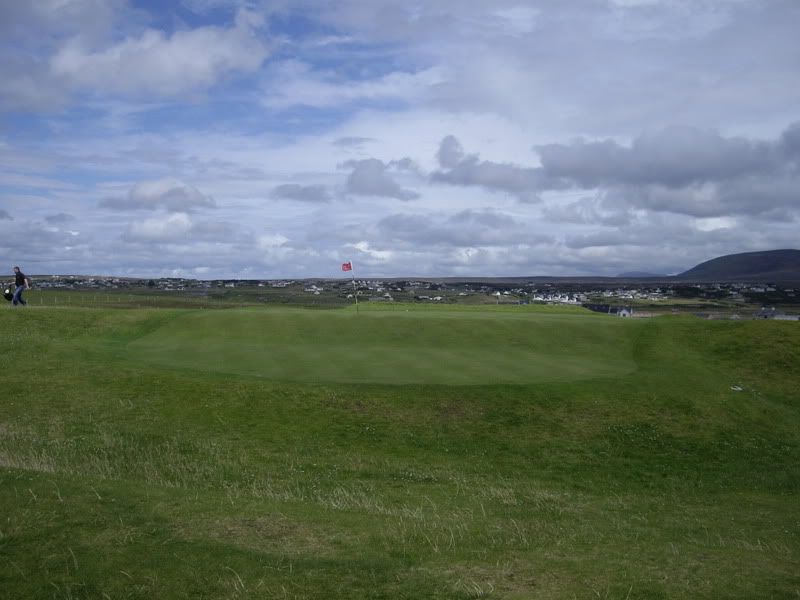 8th/17th hole: 137 yds/ 115 yds, Par 3
8th/17th hole: 137 yds/ 115 yds, Par 3This is the only green on the course that required any construction; the rest of the greens are natural sites. In the 1980s, there was a natural steep slope up to the top tier. The green was very difficult to hit, so a lower tier was built.
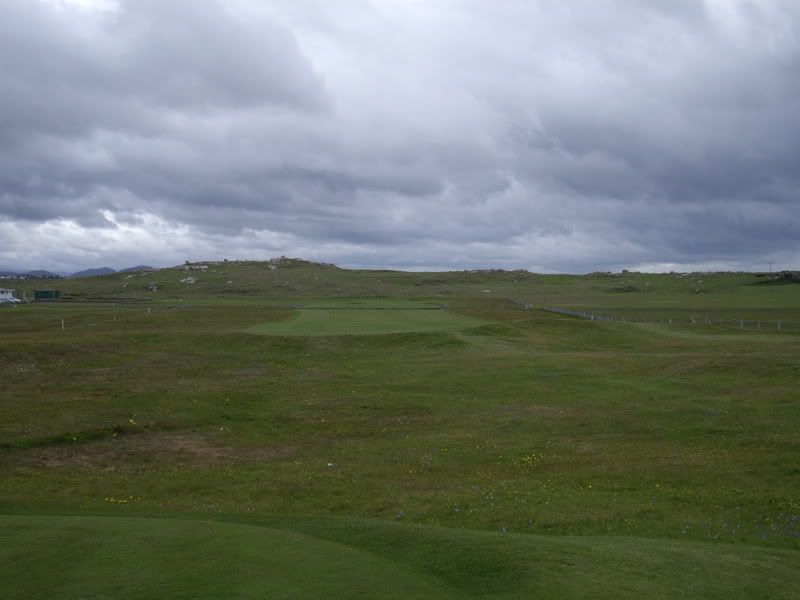 9th/18th hole: 349 yds/ 361 yds, Par 4
9th/18th hole: 349 yds/ 361 yds, Par 4A view of the 9th/18th fairway from the 2nd green. Any ball on or over the road on the right is out of bounds.
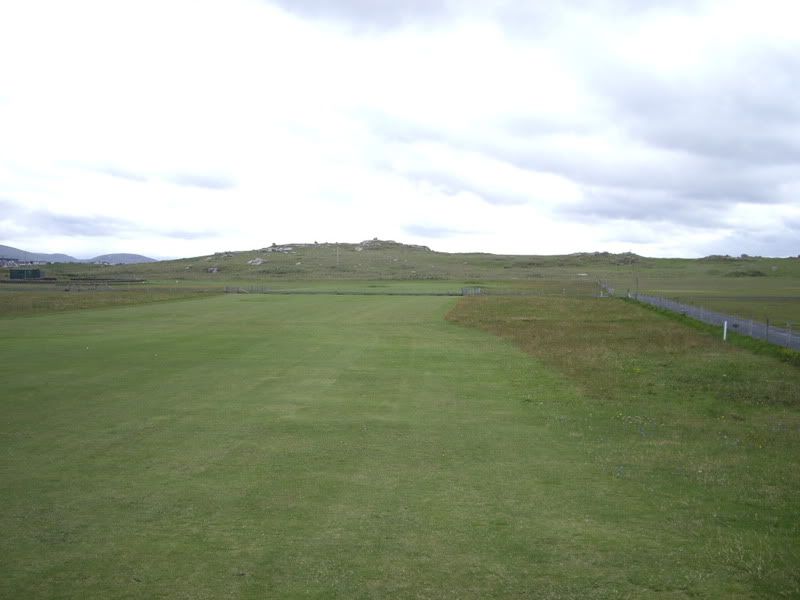 9th/18th fairway:
9th/18th fairway: The second shot must avoid two greenside bunkers. The safest shot is to be long.
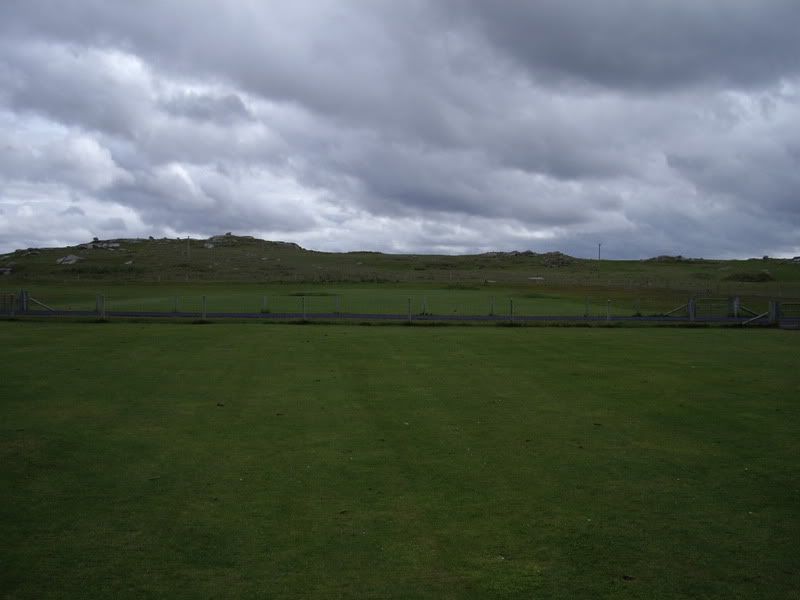 9th/18th fairway:
9th/18th fairway: A good drive to here will leave 100-120 yds to a relatively flat green.